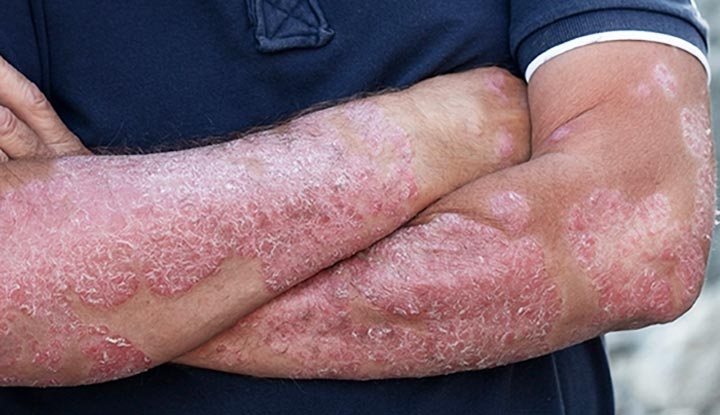Psoriasis is one of the most common skin diseases and the most recent studies estimate that it can affect 2.3% of the population. Most people who suffer from psoriasis do so mildly and only about 20% develop severe or moderate symptoms.
When attacks occur, it causes red, scaly, itchy spots, especially on the knees, elbows, trunk and scalp, but it can also appear on the nails. It is a disease for which there is currently no cure. What there is are treatments that help control symptoms and lifestyle habits that help people live better with this disease.
The visibility of the disease makes its diagnosis relatively easy, as explained by Dr. José Manuel Carrascosa, coordinator of the Spanish Psoriasis Group of the Spanish Academy of Dermatology and Venereology (AEDV). "In any case, despite this ease of diagnosis, it is possible that there is a percentage that is not well diagnosed, but except in some less conventional forms, in general it is not one of the most difficult pathologies to diagnose."
Santiago Alfonso, director of Acción Psoriasis, points out that, however, it is necessary to continue improving in the diagnosis of the disease. “Diagnosis remains necessary and all patients, regardless of the severity of the disease, should consult a dermatologist.”
Still a stigmatizing disease
Precisely because it is a visible disease, although it helps in its diagnosis, it also represents a problem for those who suffer from it. Many have felt rejected by the visibility of their injuries, even though it is not a contagious disease, and this has generated a stigma that has not yet been overcome in our society.
Some of the new treatments for psoriasis have achieved a revolution in their treatment and have managed to very effectively whiten the skin of many patients. “But it is still a visible disease. Increasingly, skin and image play a very important role in our society and there continue to be episodes of rejection for patients with psoriasis who often seek to hide their disease,” adds Santiago Alfonso.
For Dr. José Manuel Carrascosa, this stigma of psoriasis not only has an implication at the level of mental health, but can affect the work life or social activity of people with psoriasis, especially when The lesions occur in the most visible areas.
Well-hydrated skin, essential advice
One of the keys to good management of psoriasis is to ensure that the skin is well hydrated at all times. This will help prevent the crises characteristic of this disease from occurring so frequently, in which the redness of the skin and itching become more evident. Therefore, although psoriasis is not directly related to hygiene, it plays an important role in avoiding infections and new wounds.
Raquel Aguado, member of Dermopharmacy and Health Products of the Official College of Pharmacists of Madrid, emphasizes the importance of this skin hydration. “For this, it is important to use abundant emollient lotions rich in lipids or fats and keratolytics, drugs that are characterized by totally or partially dissolving the stratum corneum of the skin. This will favor the elimination of the plaques characteristic of psoriasis and the penetration of moisturizing treatments. In addition, taking extreme care of your skin will improve your appearance, which will also help people have a better body image and increase their self-esteem.”
Another important tip to maintain adequate hydration is to avoid products rich in soaps and detergents, since these promote skin irritation, as Dr. Carrascosa explains. “On inflamed skin it is very important to use non-soap products, since these dehydrate the skin a lot. Likewise, it is also advisable not to use very hot water and quick showers are preferable to baths.”
Importance of nutrition and stress
Nutrition is known to have a very important impact on psoriasis, as Santiago Alfonso very well emphasizes. “Controlling weight, tobacco and alcohol is the first treatment for psoriasis. It is known that being overweight is closely related to inflammation in this disease and a key objective is to also reduce alcohol consumption and quit tobacco."
Dr. José Manuel Carrascosa also agrees in pointing out the importance of nutrition in patients with psoriasis and the importance of following good eating habits. “Fatty foods should be avoided as much as possible, as they are known to facilitate inflammation. Vegetables and fruits also have a certain effect on reducing this inflammation. But the most important thing is to help with advice for a diet that helps maintain an adequate weight, since obesity has a great inflammatory impact that aggravates psoriasis."
Stress also greatly influences psoriasis, as Santiago Alfonso comments. “Stress aggravates psoriasis attacks and psoriasis attacks cause stress in the patient. That is why the control of stress and mental illness is very important in these patients.” To help with this control, the use of natural products such as valerian or passionflower can be considered. “In these cases it will be important to check that there is no interaction with your treatment. Although from my point of view, and since it is a chronic disease, it is more beneficial to influence healthy lifestyle habits capable of combating stress by knowing how to identify its symptoms,” adds Raquel Aguado.
Santiago Alfonso also emphasizes the importance of education for psoriasis patients. “There are many pathologies that require a change in attitude and investment of time, and psoriasis is one of them. We must make it understood that this disease must be included in life and that we must dedicate the time it requires. It is essential to emphasize the importance of following the treatments indicated by dermatologists, since in many patients, especially those with mild to moderate disease, lack of adherence is a problem."






















































